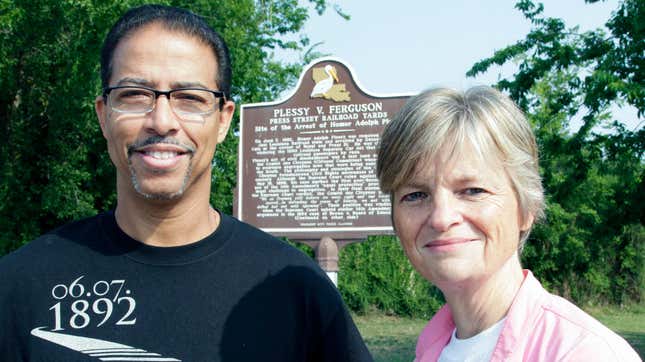
After 125 years, Louisiana Gov. John Bel Edwards pardoned on Wednesday Homer Plessy of the 1897 U.S. Supreme Court case Plessy v Ferguson for sitting in an “whites only” train car. The case paved the way for “separate but equal” segregation laws for nearly half a century. The posthumous pardon ceremony took place on the very street where Plessy was arrested.
Plessy, a 30-year-old mixed race shoemaker, pleaded guilty on Jan. 11, 1897 to breaking a Louisiana law that required Black and white people to ride in separate train cars. He was part of a small civil rights group, the Citizens Committee, boycotting the law.
“His one attribute was being white enough to gain access to the train and black enough to be arrested for doing so,” Keith Weldon Medley wrote in the book “We As Freemen: Plessy v. Ferguson,” according to the Associated Press.
Plessy was arrested and fined $25. It was either that or 20 days of jail time. Plessy died in 1925 without having any children, according to TIME.
“Hopefully, this will give some relief to generations who have suffered under discriminatory laws,” said Phoebe Ferguson, the great-great-granddaughter of Judge John H. Ferguson who presided over the case.
It was Ferguson’s ruling that guaranteed protection of “whites only” spaces until it was overturned unanimously by the Supreme Court in the case of Brown v Board of Education in 1954.
Phoebe Ferguson and Keith Plessy, a distant cousin of Homer Plessy, created a civil rights education nonprofit organization, the Plessy and Ferguson Foundation, in 2009.
Here’s more from NOLA:
Orleans Parish District Attorney Jason Williams, whose predecessor in the office prosecuted Plessy under Louisiana’s 1890 separate car act, said seeking the pardon was a necessary act.
“It was important that the office that prosecuted Homer Plessy be the office that asked for his name to be pardoned,” Williams said. “I submitted it asking for us to be forgiven, the institution.”
The Louisiana Pardon Board recommended the pardon in November, under a law initially designed to allow for pardons of veterans of the 1950s and 1960s civil rights movement.
Edwards quoted from the dissent of John Marshall Harlan, the sole vote against the majority in Plessy v. Ferguson, before he issued the pardon.
The ceremony took place outdoors at the New Orleans Center for Creative Arts, which sits on the street where Plessy was arrested. It was renamed Homer Plessy Way in 2018.
“The pernicious effects of Plessy (v. Ferguson) linger still in terms of race relations, equality and justice. We are not where we should be, and quite frankly we’re not where we would have been had at least four other justices had the same fidelity to the Constitution,” Edwards said at the ceremony, according to NOLA.
“I feel like my feet are not touching the ground today, because the ancestors are carrying me,” Plessy said, according to NOLA.

